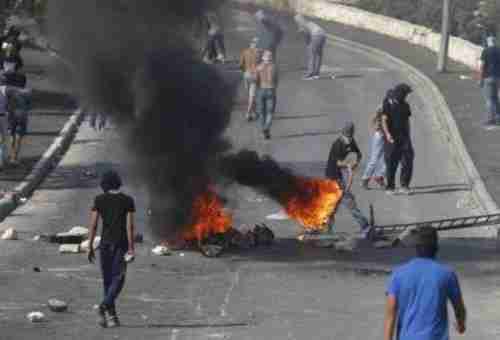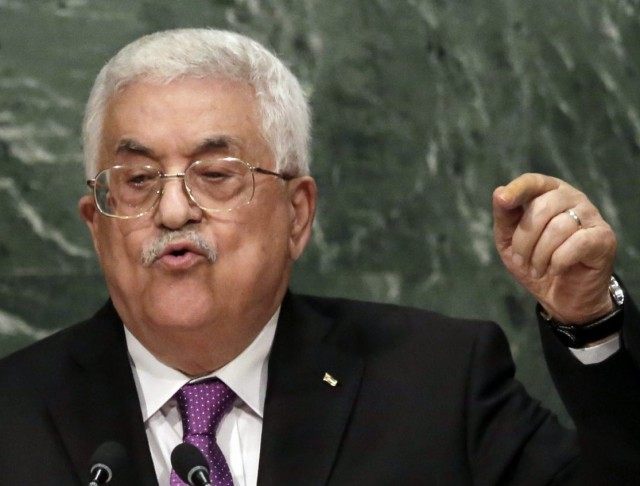This morning’s key headlines from GenerationalDynamics.com
- Violence in Jerusalem increases after Abbas’s UN speech
- Abbas’s UN speech raises concerns about a Palestinian ‘third intifada’
Violence in Jerusalem increases after Abbas’s UN speech

Palestinians set tire on fire during clashes with police in East Jerusalem on Sunday (Reuters)
For the last three weeks, there have been a series of clashes between Israel’s police and Palestinian protesters at the sensitive Temple Mount/Al-Aqsa Mosque compound in Jerusalem. Rioters have been throwing rocks and petrol bombs, while barricading themselves in the Al-Aqsa mosque, forcing Israeli police eject them. Israeli security forces responded with tear gas and stun grenades.
Israel’s Prime Minister Benjamin Netanyahu declared “war” on stone-throwers, after the stone throwing caused a traffic accident that killed a Jewish man. Netanyahu authorized increased use of live fire.
As the clashes continued, dozens of Palestinians were wounded by live fire and rubber bullets. Hamas responded by calling for a “day or rage” over tensions at the site. The clashes were further provoked by Palestinian Authority president Mahmoud Abbas on Wednesday, when he threatened to repudiate the 1993 Oslo peace agreement.
On Saturday (two days ago), a 19-year-old Palestinian killed two Israelis and wounded a woman and child in a gun and knife attack. On Sunday, a Palestinian was shot dead by police, after he stabbed and wounded a 15-year-old.
Violence in the Temple Mount/Al-Aqsa Mosque compound in Jerusalem is extremely sensitive. Temple Mount is the holiest site in the Jewish religion, and the Al-Aqsa Mosque is the third holiest site in Islam, after Mecca and Medina. When violence forced Israel to shut down access to the Al-Aqsa mosque for two days in February of this year, Palestinian Authority president Mahmoud Abbas called it “tantamount to a declaration of war,” and Jordan recalled its ambassador to Israel. Jordan said that Israeli practices in Jerusalem were undermining 1994 peace treaty between the two countries. The peace treaty had reaffirmed Jordanian oversight of Jerusalem’s holy sites.
On Sunday, an angry Netanyahu announced a “harsh offensive” on Palestinian violence. New measures would include speeding up the razing of homes of Palestinian attackers and banning those who incite violence from the Old City. Netanyahu said that he would step up administrative detentions, deploy more forces in Jerusalem and in the West Bank and to remove agitators from Jerusalem’s Old City and Temple Mount.
Possibly even more significant, Israeli police are now restricting access to Jerusalem’s Old City. Only Israeli citizens, Old City residents, tourists, businesspeople working in the area and students studying there will be allowed to enter. Also, Muslim men under the age of 50 will be prevented from attending prayers at the Al-Aqsa Mosque, which is similar to the restriction that led to Palestinian outrage in February of this year. Reuters and Guardian (London)
Abbas’s UN speech raises concerns about a Palestinian ‘third intifada’
Palestinian leaders are expressing outrage, especially over the restrictions on access to the Al-Aqsa Mosque. According to one Palestinian official:
What’s happening today is a renewal of Israeli arrogance and recklessness. Jerusalem is now a military base, sons of Jerusalem are now banned from entering the Old City.
PLO Secretary-General Saeb Erekat said:
These events are reminiscent of September 2000 [the start of the second intifada]. … Experience shows us that Israel cannot prevent Palestinian freedom by forceful measures. … [We] are in touch with leaders in the Arab world and International community in order to prevent Israel from expanding into a greater ground incursion.
Erekat might also have mentioned that these events are reminiscent of the week’s preceding last summer’s Gaza War. After it was over, Hamas said that it was only trying to foment a “third intifada.” ( “22-Aug-14 World View — Hamas says it didn’t intend to start the Gaza War”)
The first two intifadas occurred, respectively in 1987-93 and 2000-03. What makes an intifada different from an ordinary riot is that it receives more widespread popular support, and the riots and violence are more sustained, rather than sporadic. The first intifada resulted in constant scenes of Palestinians throwing rocks at Israeli army and police in daily clashes, and it eventually led to the 1993 peace treaty.
The second intifada was triggered by a visit to the Al-Aqsa mosque by Ariel Sharon in 2000. This intifada went beyond rock throwing into pitched gun battles, suicide bombing and terrorist activities. It led to the building of the wall that separates much of Israel from the West Bank.
Many people predicted a third intifada in 2014, but there was a 60-day full-scale Gaza war instead.
The violence in Jerusalem has been further fueled by the ‘bombshell’ ultimatum that Palestinian Authority president Mahmoud Abbas delivered to Israel in his United Nations speech on Wednesday. He threatened to stop abiding by the terms of the 1993 peace agreement, and suggested that he would end the Palestinian-Israeli security agreement where Palestinian security forces are responsible for policing the West Bank. If the agreement is ended, then Israel would be responsible, as the “occupying power,” to police the entire West Bank. This would trigger numerous clashes between Palestinian protesters and Israeli police, and may be all that’s necessary in the present climate to start a third intifada.
According to Erekat, the Palestinian leadership is waiting for Abbas to return back to the West Bank from his UN trip, in order to implement “what (he) declared in his speech” to the UN. Jerusalem Post and CNN and YNet and Telegraph (London – 6-Nov-2014)
KEYS: Generational Dynamics, Israel, West Bank, Jerusalem, Benjamin Netanyahu, Temple Mount, Al-Aqsa Mosque, Hamas, Mahmoud Abbas, Saeb Erekat, Gaza war, first intifada, second intifada
Permanent web link to this article
Receive daily World View columns by e-mail

COMMENTS
Please let us know if you're having issues with commenting.